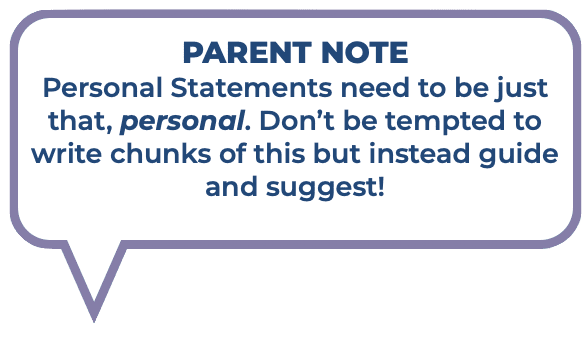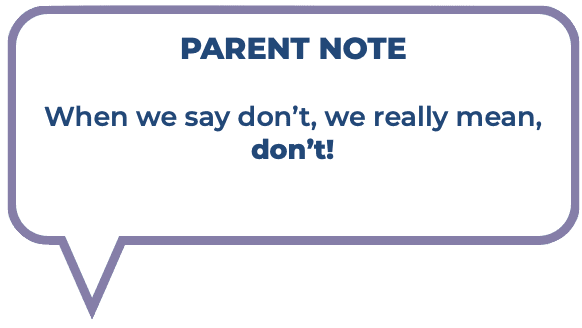
Grade 11
Preparing your UCAS Personal Statement
In this section you can:
- Learn about writing your personal statement from the experts.
- Build a plan that you make sure you stay on task.
- Explore the things you must include in your statement.
- Get answers to your frequently asked questions.
- Find out the things you should NOT do!

The Expert View
Getting your Personal Statement right is essential for success.
Read this to get the complete picture…

Let’s take a look…
When we talk about personal statement writing, we normally refer to the personal statement that forms an important part of the UCAS application. (UCAS is the centralized application system used in the UK.) However, you should be aware that universities in other countries also demand that you submit a piece of writing justifying why the university should offer you a place. In the United States you will be required to write college essays, these vary considerably in focus, however they are all aimed at providing the admissions tutors with a picture of you as a prospective university student. (Wigsbury produced a separate module on how to write US college essays)
Many Dutch universities will require what is called a motivation letter, this is very similar to the UCAS personal statement in its structure and purpose.
What you’re about to read below, is aimed specifically at UCAS personal statement writing and is largely based on workshops at both Oxford and Cambridge universities where the admissions tutors (these are the people who read personal statements and decide whether you get a place at university or not) shared with us counselors what it is they are looking for in a good personal statement. There is also a wealth of useful information on the UCAS website… including a video.
So let’s get down to business, this is what you need to know...
There is no right or wrong way to write a personal statement: the message received from the university admissions tutors at every personal statement writing workshop the counselors have attended is clear: they just want to hear your voice; they do not want a perfectly polished product with too much adult input.
Let’s begin by considering how your UCAS personal statement fits into your overall application.
Admissions tutors will be looking at your predicted IB grades, your teacher or counselor reference and probably the grade you achieved at the end of grade 10.
When you come to make your UCAS applications, it will be too late to change your grades, however you will have control over your personal statement. This is your chance to talk to the university and to persuade them to take you. Let’s make sure you maximise this chance.
A personal statement helps you to make your application stand out. When several students with the same grades have applied for a place on a course, the admission tutors will look to the personal statement to help them decide which students to select.
Writing a personal statement is a bit like writing an essay in English class. As you write you need to be aware of the following:
Purpose – to persuade the university to take you
Audience -university admissions tutors who have devoted their lives to their subjects and would like to teach young people who share their passion
Content – it must serve the purpose and be relevant and focused
Structure – you need to have a strong introduction, a series of paragraphs linked by transitions, and a firm conclusion
Register – use appropriate, correct English. You do not need to swallow a thesaurus!
And finally, check your work carefully, don’t just rely on spellcheck. Better still, ask someone else to proofread it for you, they are more likely to spot the mistakes.
Practical first steps
- A good starting point – jot down all the things you feel you might like to include.
- Gather together all your certificates, papers and notes.
- Do not expect to complete either the list or the personal statement quickly.
- Talk to your teachers, parents and friends at university.
Make a good impression
- Don’t repeat information.
- Take care with the layout – make the most of what you’ve got!
- Take care with your sentence structure and check your spelling and grammar.
- Unpack and expand on things e.g. “I am a team captain”, leadership, punctuality, reliability, communication, organisation.
- Don’t finish up with a long list of unrelated hobbies.
- Be positive and enthusiastic.
- Don’t ramble, or pad it out (You do not have to write up to the maximum 47 lines/4,000 characters).
- Structure your information to reflect the skills and qualities the universities value most – use the course descriptions to help you.
Planning is important
- Start during the summer holiday at the end of grade 11…or earlier.
- Think carefully about why you are applying to university.
- Check course requirements and details.
- Draft a statement and read it over and then read it again.
- Get a friend to read it over – ask them if it represents you correctly.
Things to avoid!
- Lack of in-depth awareness of subject.
- Applying to many unrelated courses.
- Focusing on one subject if making a joint application.
- Using anything university specific (“I want to apply to Manchester University because………”).
- Unsubstantiated claims (I want to be President).
- Jokes/humour.
- Plagiarism.
Dos & Don’ts
Do expect to produce several drafts of your personal statement before being totally happy with it.

Don’t exaggerate – if you do, you may get caught out in an interview when asked to elaborate on an interesting achievement.
Don’t leave it to the last minute – your statement will seem rushed, and important information could be left out.

Some things that you must include…
From UCAS
Are you still struggling with what you need to write? Not sure what the content should be? Well, read on as this will list what you need to be putting in your personal statement.
- Why you are suitable for the course.
- How your IB subjects prepare you for the course that you have chosen. Here you can mention a unit you have studied which was particularly interesting and relevant.
- Universities like to know the skills you have. List these skills and any supporting evidence to back up why you are so excited about the courses you have chosen.
- Include any achievements you’re proud of, positions of responsibility that you hold or have held both in and out of school, and attributes that make you interesting, special, or unique.
- Include details of jobs, placements, work experience, or voluntary work, particularly if it’s relevant to your chosen course. Try to link any experience to skills or qualities related to the course.
- Look at course descriptions and identify the qualities, skills, and experience they require – you can use these to help you decide what to write about.
- Tell the reader why you’re applying – include your ambitions, possible career plans as well as what interests you about the subject.
- Think about what makes you suitable – this could be relevant experience, skills, or achievements you’ve gained from education, work, or other activities.
- Include any clubs or societies you belong to – sporting, creative, or musical.
- If you took part in a higher education taster course, placement, or summer school, or something similar, include it.
- International students can also say why they want to study in the UK.
- If there are any personal circumstances which have affected your educational performance, outline them in your personal statement. E.g a physical or mental health condition that’s caused you to miss school.
- Maybe you had to change schools mid-way through your course and the new school doesn’t offer the same subjects.
Action Ideas
Things to do now that will make a difference
Action 1:
Start early and do some research to decide what subject you want to study at university
ACtion 2:
Having decided on your subject, start planning and writing your personal statement
Try and get all this done by the end of the summer vacation, as when you come back to school in grade 12 you have to actually make your applications to universities as well as managing all your IB diploma work.

Find out more…
Explore these videos to enhance your understanding
Things to avoid in your Personal Statement
Don’t do these!
Do not have a cheesy opening line such as, ‘ever since I was three years old I wanted to be an economist’ this is hardly credible as three year olds have never heard of economics and prefer to focus on playing with their toys and eating!
Don’t mention any university by name. Do not say, ‘I really want to go to Manchester University,’ because the other four universities will assume that you’re not really interested in them and will most likely not give you an offer.
Do not claim to have done something unless it is true.
Do not claim to have read a book unless you actually have…
you may get caught out at interview.
Do not use a whole paragraph talking about your father’s success in business when the personal statement needs to focus on you. It is okay to say that your father inspired you to study business, but keep it brief.
Wigsbury Frequently asked questions
Quick answers to the important questions
Do I have to decide what subject I’m applying for, before I write my personal statement?
Yes. The personal statement needs to show your passion for the subject.
Can I get help with writing my personal statement or do I have to do it all myself?
As with any piece of writing, it’s a good idea to get feedback, it helps you improve the piece of work. However, the university wants to hear your voice and it must be your personal statement.
When should I start writing my personal statement?
The sooner the better, this is going to take you longer than you think. However, you will first of all need to decide what subject you are going to apply for as your personal statement needs to focus on your passion and suitability for that subject.
How should I go about planning my personal statement?
Approach this writing task as you would any other, for example in a similar way to writing an essay for English class. Take a look at the advice here in this module. Writing a personal statement is not a scary task, after all you have probably written hundreds of essays already, this is just another essay but with a very specific purpose: to get you into university.
How long is a personal statement?
Maximum 47 lines or 4000 characters.
I’m not very good at writing, can I get someone else to write my personal statement?
No. Getting someone else to write your personal statement, especially if that person is an adult, is a big mistake. The university wants to hear your voice, your passion, your interest for the subject… UCAS uses plagiarism software. Be warned!
How much of my personal statement should be about my academic subjects, and how much about my extracurricular?
The balance needs to be approximately 80% academic and 20% extra-curricular.
Can I ask someone to provide feedback on my personal statement?
Most certainly, it is always a good idea to let someone else give you some critical feedback to help you improve, particularly in the areas of structure and content.
I am struggling to brainstorm ideas for my personal statement. What can I do?
Sometimes it’s difficult to think of all the things that you are good at and have done both in school and out of school. Ask one of your friends to tell you what you are good at, what your positive traits are, and remind you of your successes etc. This will help you brainstorm ideas.
There are lots of personal statements on the internet, can I just copy one, maybe tweak it a little bit?
No. UCAS uses plagiarism software. This would not be a clever idea. Remember, the universities are not looking for a perfect, polished piece of adult style writing, they just want to hear a teenager’s voice expressing his or her passion and interest for the subject.
Can I ask my teachers for feedback?
Yes, most students do this. Just a word of caution, don’t ask too many teachers as they will all have different opinions and you will just end up confused. The personal statement is subjective, there is no definitive right or wrong way of producing a personal statement.
I am applying for a mix of subjects and UCAS only allows one personal statement. How can I share my passion for the different subjects I’m applying for?
This is certainly a problem with the UCAS application system in that you only get to write one personal statement. However, there are ways around this problem. When students apply for different subjects, they are often in the same subject area. E.g. Biochemistry at one university, environmental sciences at a second university etc. In this example you would just need to talk about your passion for the sciences and suggest that you are open to pursuing a career in different scientific fields.
